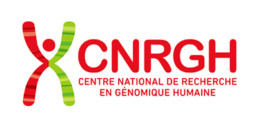Sequencing and genotyping platform of CNRGH
The CNRGH is one of the two national platforms of the France Génomique infrastructure. Located in Evry, the CNRGH is the French national research center which enables a response to scientific questions linked to human diseases necessitating high throughput sequencing and genotyping, thanks to the development and deployment of innovative integrated technologies. The organization of the CNRGH enables optimization of genetic and genomic research on human diseases by creating indispensable links between cohort constitution (DNA samples), identification of the responsible genes, and study of the transcriptome and epigenome. Thanks to its capacities in sequencing, genotyping, bioinformatics and data analysis, the CNRGH enables the completion of very large-scale human genomics projects.
Expertise
Since its creation, the CNRGH has evaluated and integrated the best technical advances in genomics in order to maintain its competiveness at international level. In order to identify the responsible genes and biomarkers associated with human diseases, the CNRGH is organized in several laboratories, including:
- A biobank laboratory which manages and prepares all samples analyzed in the projects
- A high throughput data production laboratory, that operates Illumina high throughput sequencing and genotyping platforms
- A development laboratory enabling implementation of smaller projects requiring the set up of special protocols (targeted sequencing, very low input library preparations,…) and evaluating emergent technologies and ensuring their transfer to production (ex : ONT Long read sequencing )
- An epigenetics laboratory, which is developing a set of innovative technologies for the analysis of DNA modifications
- A functional genomics laboratory, working on technologies designed to elucidate the molecular and cellular impacts of genomic variations associated with diseases
- In addition, data quality control as well as primary and secondary analysis are ensured by a dedicated data quality control team, a bio-informatics and a bio-analysis laboratory, with the support of a bio-statistics group, which is responsible for validation of experimental designs and statistical analysis of data
Equipments
- Sequencing : 3 Illumina NovaSeq6000, 1 Illumina NextSeq500, 2 Illumina MiSeq, 8 MinION Oxford Nanopore Technologies, 1 Promethion Oxford Nanopore Technologies, 1 Chromium 10X Genomics
- Robotics : 4 Bravo-Working Station Agilent, 2 Freeddom Evo Tecan, 4 Janus Perkin Elmer,1 Zephyr Perkin Elmer, 3 Sciclone NGSx Perkin Elmer, 1 EpMotion Qiagen
- Genotyping : 3 iScan Illumina
- Computing capacity (locally and at the CEA high-performance computing center): > 6500 calculation cores and 8,5 Po of storage

Data quality assurance
Sample and data tracking are ensured throughout the process by a barcode labels system. Unique barcodes are associated to all samples at the beginning of the project and used at each data production, QC and analysis steps. All samples and data production steps are registered in the Laboratory Information Management System (LIMS) dedicated to the different platforms of the facility. Automated primary analysis pipelines with integrated QC systems have been set up to guarantee data quality.
Main achievements
The CNRGH contributes to several ongoing National (LabEx GenMed, RHU RECORDS) as well as European research programs (EASIGENOMICS, CANDY, MyPeBS, IMMUNAID, RESCUER, KATY). Involved in the implementation of ambitious projects such as the elucidation of the genetic causes of rare diseases, the study of the genetic bases of autism or Alzheimer disease and the genetic causes of the toxicity of breast cancer therapies, to cite only a few examples of large scale projects conducted at the CNRGH during the last few years. The CNRGH contributed to the production of ‘patrimonial’ data on the French population in order to supply the scientific community with the reference data needed to identify the genetic/genomic variations underlying diseases. In addition, the data production of the pilot projects for the French Plan for Genomic Medicine 2025 is performed at CNRGH (~10 000 WGS in total). The CNRGH teams have implemented, after scientific evaluation, over 500 research projects derived from about 300 French laboratories and over 60 foreign laboratories and in the last 10 years, the CNRGH has produced up to ~15 000 WG and ~10 000 WES. For those activities, the CNRGH has contributed, since its creation, to over 600 publications in internationally reputed scientific journals.
Philippi A, et al. Mutations and variants of ONECUT1 in diabetes. Nat Med. 2021 27(11):1928-1940. doi: 10.1038/s41591-021-01502-7.
Choin J. et al. Genomic insights into population history and biological adaptation in Oceania. Nature 2021 592(7855):583-589. doi: 10.1038/s41586-021-03236-5.
Crow Y. et al. cGAS-mediated induction of type I interferon due to inborn errors of histone pre-mRNA processing. Nat Genet. 2020 52(12):1364-1372. doi: 10.1038/s41588-020-00737-3.
Kunkle et al. Genetic meta-analysis of diagnosed Alzheimer’s disease identifies new risk loci and implicates Aβ, tau, immunity and lipid processing. Nat Genet. 2019 51(3):414-430.doi: 10.1038/s41588-019-0358-2
Bayard Q. et al. Cyclin A2/E1 activation defines a hepatocellular carcinoma subclass with a rearrangement signature of replication stress. Nat Commun. 2018 9(1):5235. doi: 10.1038/s41467-018-07552-9
Last update Nov 2021

Certification / Quality Assurance
Laboratory Information Management System (LIMS) dedicated to the different platforms of the facility, and automated primary analysis pipelines with integrated QC systems.
Platform Managment
Anne Boland
CEA / DRF / Institut de Biologie F. Jacob
CNRGH
2 rue Gaston Crémieux
CP5706
91057 Evry cedex (France)

